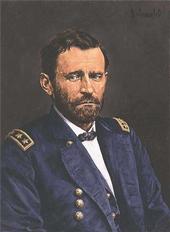Grant
Ulysses S. Grant[2] (born Hiram Ulysses Grant, April 27, 1822 – July 23, 1885) was an American general and the 18th President of the United States (1869–1877). He achieved international fame as the leading Union general in the American Civil War, capturing Vicksburg in 1863 and Richmond in 1865. He accepted the surrender of his great Confederate opponent Robert E. Lee at Appomattox Courthouse.
After service in the Mexican-American War, an undistinguished peacetime military career, and a series of unsuccessful civilian jobs, Grant returned to service in 1861 at the outset of the Civil War and proved highly successful in training new recruits. His capture of Fort Henry and Fort Donelson in February 1862 marked the first major Union victories of the Civil War and opened up prime avenues of invasion to the South. Surprised and nearly defeated at Shiloh (April 1862), he fought back and took control of most of western Kentucky and Tennessee. His great achievement in 1862-63 was to seize control of the Mississippi River by defeating a series of uncoordinated Confederate armies and by capturing Vicksburg in July 1863. After a victory at Chattanooga in late 1863, Abraham Lincoln made him general-in-chief of all Union armies.
Grant was the first Union general in the war to initiate coordinated offensives across multiple theaters. While his subordinates Sherman and Sheridan marched through Georgia and the Shenandoah Valley respectively, Grant personally supervised the 1864 Overland Campaign against General Robert E. Lee's Army in Virginia. He employed a war of attrition against his opponent, conducting a series of large-scale battles with very high casualties that alarmed public opinion, while maneuvering ever closer to the Confederate capital, Richmond. Grant announced he would "fight it out on this line if it takes all summer." Lincoln supported his general and replaced his losses, and Lee's dwindling army was forced into defending trenches around Richmond and Petersburg. In April 1865 Grant's vastly larger army broke through, captured Richmond, and forced Lee to surrender at Appomattox. He has been described by J.F.C. Fuller as "the greatest general of his age and one of the greatest strategists of any age." His Vicksburg Campaign in particular has been scrutinized by military specialists around the world.
Grant announced generous terms for his defeated foes, and pursued a policy of peace. He broke with President Andrew Johnson in 1867, and was elected President as a Republican in 1868. He led Radical Reconstruction and built a powerful patronage-based Republican party in the South, with the adroit use of the army. He took a hard line that reduced violence by groups like the Ku Klux Klan. Although Grant was personally honest, he not only tolerated financial and political corruption among top aides but also protected them once exposed. He blocked civil service reforms and defeated the reform movement in the Republican party in 1872, driving out many of its founders. The Panic of 1873 pushed the nation into a depression that Grant was helpless to reverse. Presidential experts typically rank Grant in the lowest quartile of U.S. presidents, primarily for his tolerance of corruption. In recent years, however, his reputation as president has improved somewhat among scholars impressed by his support for civil rights for African Americans.[3] Unsuccessful in winning a third term in 1880, bankrupted by bad investments, and terminally ill with throat cancer, Grant wrote his Memoirs which was enormously successful among veterans, the public, and the critics.Grant the President
Try the BEST MySpace Editor and MySpace Backgrounds at MySpace Toolbox !
